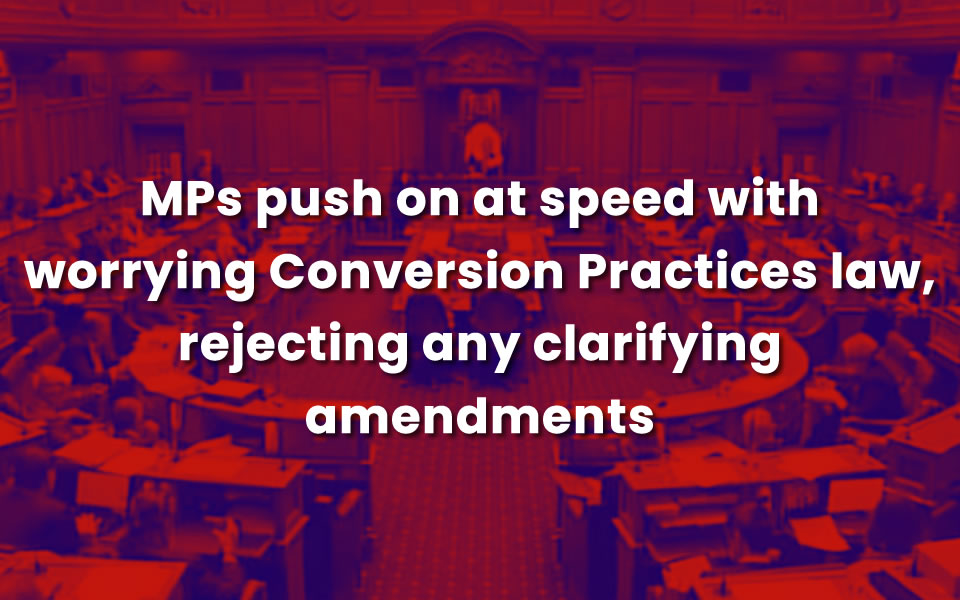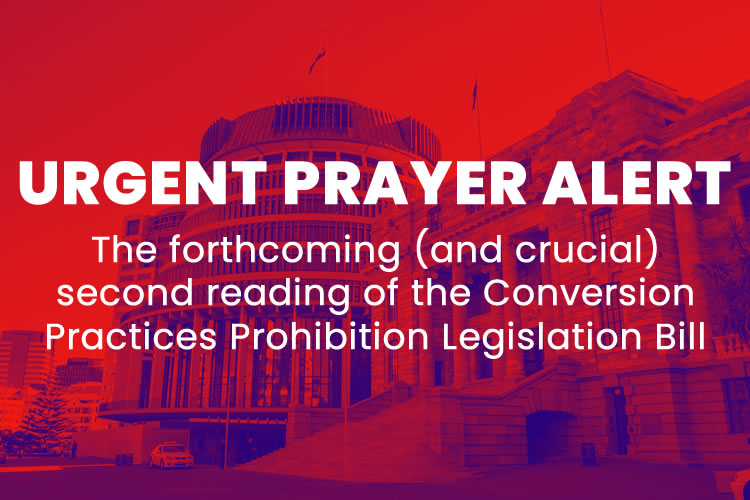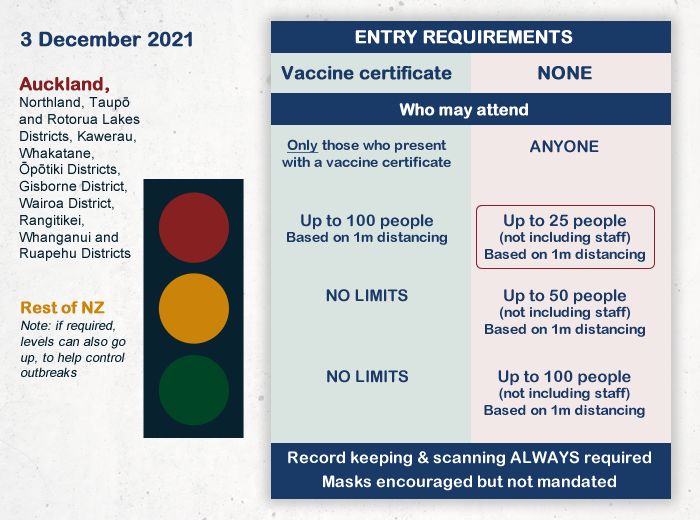
by Dr Stuart Lange | 10 Feb , 2022 | Articles, Christianity and Social & Moral Issues, Christianity in New Zealand
What has happened?
While the country has been preoccupied with other matters, including the somewhat chaotic protest outside Parliament, inside Parliament the Government has this week pushed through the second reading and committee stage of the Prohibition Practices Prohibition Legislation Bill, in the space of just two evenings. The third and final reading is expected soon.
Political realities
None of this is a surprise. The Bill fulfills a promise in the Labour Party’s election manifesto. Labour has a large majority, the Bill is a Government Bill, and all Labour MPs have no choice but to vote for it. Also, the Greens and Māori parties have also bloc-voted for the Bill.
The select committee process was in some respects a hollow process: most members of the Justice Committee seemed unwilling to respect or accommodate the concerns of many thousands of submitters.
A number of helpful amendments were suggested, but do not appear to have been seriously considered by the Justice Committee.
The amendments that a few courageous MPs put forward at the third reading were quickly voted down, after minimal debate (but most amendments were supported by ACT and by the majority of National MPs).
None of this has looked like open, collaborative, fair-minded democracy. It has looked more like power politics.
Is the new law good or bad?
At one level, almost everyone agrees with the core stated purpose of this new law: to ‘prevent harm caused by conversion practices’ (i.e. by banning ‘conversion practices’ related to sexuality and gender identity). In principle, that is fine: any law should rightly help protect people against harm, including harm from therapies which are coercive and demeaning.
But because various appropriate behaviours are not clearly excluded in the application of the law, the effect of the law in some circumstances will be to inhibit parents, counsellors, health professionals, church leaders and others from offering advice, support, and prayer – even when that is sought – for fear of being criminalised for any words or actions which could be construed as ‘intended to change or suppress a person’s sexual orientation, gender identity, or gender expression’.
The new law thus denies the right of some people to request and receive the help they want.
In not specifically excluding prayer, the law compromises freedom of religion and the separation of church and state.
Presumably everyone also agrees with the second stated purpose of the new law: to ‘promote open and respectful conversations about sexuality and gender’.
The big question, though, is whether the new law will in practice promote open conversations or instead restrain them. As worded, the law does not clearly enough distinguish between ‘harmful’ conversion practices and open-ended and respectful conversations in the contexts of family, counselling, and pastoral support.
There is no doubt that the law will freely allow conversations that favour same-sex orientation and gender transition. But it appears to discourage conversations that might express any cautions about those. This appears to compromise the New Zealand Bill of Rights’ guarantee of freedoms of thought and expression.
Can the reassurances be trusted?
We are not very sure about that. The Minister of Justice has insisted that many things would ‘not be captured’ by this law, and that clarifying amendments were therefore ‘unnecessary’. But many people feel that if something is not intended to be captured by the law, it should be very clearly stated in the wording of the law itself.
We were disappointed that no amendments were achieved, and that the widely-accepted NZCN proposed amendment was not taken up by any MP (as this addressed some key problems in the Bill).
[in this Act, conversion practice does not include— ]
(g) respectful and open discussions regarding sexuality and gender, and advice, guidance, prayer, or support given to anyone by anyone else including parents, family members, friends, counsellors, religious leaders, or health professionals, when such advice or support is requested, and is respectful and non-coercive.
How will this law be applied?
Time will tell. It is possible this law will be applied only to undoubtedly harmful and extreme cases of actual conversion therapy. It is equally possible that this law is deliberately intended as deep social engineering, and that, as the years go by, this law will increasingly be applied to what many New Zealand people would see as perfectly acceptable examples of opinion, belief, advice, and parental guidance. The scope and meaning of the law will no doubt be tested in the courts, with considerable pain for all involved.
How will Christians generally respond to the new law?
Some will not be very aware of it. Some will welcome it. Many will continue to have significant reservations. Most will continue to live and work within the rule of law. Most will also continue – as now – to have nothing to do with any uninvited, coercive, demeaning, or harmful pastoral practice. Some church denominations will write careful guidelines.
If the law starts to be inappropriately applied to legitimate expressions of belief, parenting, advice, pastoral care, and prayer, under God many Christians will ultimately follow their own godly conscience.

by NZCN Team | 5 Feb , 2022 | Articles, Christianity and Social & Moral Issues, Christianity in New Zealand
A few days ago, the Justice Committee issued its report on the Bill. The Committee received 107,000 public submissions, and (putting aside ‘form’ letters) it considered 38,900 of those. It heard 3,400 oral submissions!
Sadly, the Committee rejected the concerns of those tens of thousands of submitters who feel the Bill as currently worded is ideologically one-sided, unclear, and a serious potential threat to the rights and responsibilities of parents, the right to free conversations, and the right of people to seek the advice and support they want.
Let us be very clear: the New Zealand Christian Network agrees with the Bill that New Zealand law should affirm ‘the dignity of all people’ and uphold the ‘rights of all New Zealanders’ including rainbow people ‘to live free from discrimination and harm’. NZCN is opposed to any pastoral or counselling practice that is uninvited, coercive, unloving, or demeaning, and accepts in principle the two stated purposes of the Bill, i.e. (1) to ‘prevent harm caused by conversion practices’, and (2) to promote ‘respectful and open discussions regarding sexuality and gender’.
We don’t agree with the Bill’s ideological assumptions that gender identity is completely changeable, while sexual orientation is completely unchangeable. In our observation, some people do change, and change can be in any direction. We believe everyone should be free to seek whatever help or moral support they feel they may need.
Our key concern is that as currently worded the Bill does not distinguish between ‘harmful’ conversion practices and appropriate, open-ended and respectful conversation, counselling, and pastoral support. Because of that, we believe the Bill does not advance its second stated purpose, the promotion of ‘respectful and open discussions regarding sexuality and gender’, and would instead significantly inhibit free discussion on sexuality and gender, across society. Parents, for instance, may fear that they could be criminalised for advising a child not to take puberty blockers, a counsellor may be unwilling to help some who ask for help, and anyone may be reluctant to give advice or prayer to those who seek it. All of this compromises a number of human rights set out in the New Zealand Bill of Rights.
NZCN has thus proposed that the Bill be amended with an additional clause in Section 5 (2), that:
[in this Act, conversion practice does not include— ]
(g) respectful and open discussions regarding sexuality and gender, and advice, guidance, prayer, or support given to anyone by anyone else including parents, family members, friends, counsellors, religious leaders, or health professionals, when such advice or support is requested, and is respectful and non-coercive.
We believe that this one extra clause, or something similar, would greatly reinforce the Bill’s second stated purpose, (‘respectful and open discussions regarding sexuality and gender’), and would protect open discussion in every context, providing it was respectful and non-coercive. This short amendment, just 44 words, would address the majority of concerns which many people have expressed about the Bill. Good legislation spells things out clearly, and thus gains widespread support.
We strongly deplore the fact that a sensitive and complex moral matter such as this is being pushed through as a Government/party political measure, and that many MPs will not be allowed to vote according to their own conscience.
While many Christians may disagree with ACT on some matters, ACT has strongly and insightfully critiqued this Bill, and declares that the Bill fails to achieve the balance that is required.
We urge New Zealand Christians to be much in prayer about this matter, especially for those courageous few MPs who will speak out and seek to have the Bill amended so it is more fit for purpose, and less dangerous to several important liberties.
It would also be appropriate to communicate your concerns to some MPs.

by Dr Stuart Lange | 5 Feb , 2022 | Articles, Christianity in New Zealand
Some reflections about Waitangi, Christians, and bi-culturalism
- A key background to the Treaty of Waitangi was the evangelical Christian humanitarian movement in Britain, which was concerned about the negative impact of western colonisation on indigenous peoples around the world. Some evangelical leaders persuaded the British Government to annex New Zealand – by way of a treaty – so as to regulate the colonisation of New Zealand and prevent its worst effects.
- A crucial factor in many Māori chiefs accepting the Treaty was the widespread Māori acceptance of Christianity in the preceding decade, and Māori trust in the missionaries.
- As colonial settlement increased, so did colonists’ hunger for Māori land. Tragically, by the 1860s, this resulted in war, loss of life, land confiscations, and much unjust legislation. These injustices cast a long shadow, and also adversely affected Māori Christianity.
- As Christians, we can recognise the broad biblical principles that lie behind the Waitangi Tribunal claim processes: respect, justice, apology, forgiveness, redress.
- As Christians, whether Māori, Pākeha, or another culture, we recognise and affirm the God-given worth and dignity of everyone, and embrace God’s call to us all to be agents of reconciliation.
- We also pray for reconciliation, and for the nation’s spiritual healing.

by Dr Stuart Lange | 28 Jan , 2022 | Articles, Christianity and Social & Moral Issues, Christianity in New Zealand
As we move into 2022, it already promises to be just as challenging a year as last year, but in its own way.
Front of mind for many church leaders is how our churches may best navigate the complications of life in the Red setting, showing love and respect to everyone while also trying to keep all our people as safe as we can. Covid and the lockdowns have had a negative effect on many churches, in terms of distraction, weakened engagement, reduced attendance, and disunity. But some churches have found many opportunities for spiritual and relational growth, innovation, renewed small groups, and mission.
Beyond all that, there remain some deeper challenges for church and society in Aotearoa New Zealand, such as…
- The accelerating climate crisis, and widespread unwillingness to accept effectual changes
- Worsening social inequity
- The unaffordability of home ownership for so many people
- A prevalence of broken marriages and temporary relationships
- Much violence, abuse, and family instability
- The harm caused by various drugs
- Stress, loss of hope, and mental health issues
- Suicide (especially among youth)
- More understanding, peace, and reconciliation needed between cultures
- The preoccupation of many New Zealanders with their own choices, comforts, and pleasures
- The pervasive and often negative influences of social media
- Much confusion in society (and sometimes in churches) about God, truth, and the Gospel
- A prevailing loss of confidence in the Bible or the Christian message
- A general unawareness of the positive influences of Christian values in NZ, past and present
- A growing disdain for committed Christian faith, and its marginalisation in many quarters
- Many churches’ loss of younger generations to faith and Christian commitment
- The struggle of churches to connect well with unbelievers and help them find faith in Christ
- The politicisation of radical moral views on sex, gender, abortion, euthanasia, hate speech, and ‘conversion therapy’, and their increasing imposition upon society
- The susceptibility of some Christians to unbalanced and less-than-biblical ideologies
If that is all the case (or even some of it), there is a lot for us to do in 2022!
Mā te Atua koutou katoa e manaaki, e tiaki,
(God bless and keep you all)

by NZCN Team | 9 Dec , 2021 | Christianity in New Zealand, Featured, NZCN
Glyn very capably served as National Director of NZCN from 2003 to early 2017.
Coming to Christ as an adult, Glyn was a man of convinced Christian faith. He had a strong Gospel focus, and a keen social conscience.
Glyn was personable, a superb networker, and was well-known among a great many Christians the length and breadth of New Zealand. He had a gift for connecting people, and for getting them to work together on important projects. He was always eager that the church in New Zealand should conduct itself well in a secularising and increasingly un-Christian society, and had a heart for Christians to work together well, and for reconciliation. Glyn was well-read, thought matters through deeply, and had a good eye for different sides of various issues. He was not afraid at times to speak up for a minority viewpoint.
Glyn became closely involved in the National Church Leaders’ gatherings, where his wisdom and bridge-building was much valued. Glyn was also very supportive of New Zealand’s bi-cultural journey. He vigorously supported the Te Rongopai video documentary, and was also the driving force behind the Gospel Bicentenary Statement.
Glyn’s thoughtfulness, networking skills, and wide vision also saw him become very involved internationally, through the World Evangelical Alliance as the Secretary General of the South Pacific.
Finally, the strength of Glyn’s Christian faith and character shone through as he bravely and prayerfully fought terminal cancer. We know he is now with the Lord, and Christine and family are in our prayers.
The funeral service for Glyn Carpenter will be livestreamed from 2pm on Friday 17 December at https://youtu.be/tPhJNwjgzW4

by Dr Stuart Lange | 3 Dec , 2021 | Articles, Christianity in New Zealand
As the Traffic Light system begins, there is an impressive range of ways in which New Zealand churches are planning to move forward.
- Many churches where it appears everyone is vaccinated will move ahead with certificated services
- Many churches will hold both certificated and open-entry services, either at different times or in separate spaces
- Many churches will hold just open-entry services
- Many churches will focus on gatherings in homes, at least until February
- Almost all churches will retain an on-line worship option
One way or another, most churches are working hard to care for everyone. Whatever options are chosen, the safety of our people must always be protected.
Note: in the Red level, the 10-only limit for uncertificated gatherings has now been raised to 25, and it has been clarified that staff and workers are not counted in number limits. Also, Minister Michael Wood has clarified (and this may help some) that “Workers at gatherings are only required to be vaccinated when attendees are required to hold a My Vaccine Pass. This means that workers at gatherings that choose to operate within capacity constraints set out in the COVID-19 Protection Framework, without vaccine passes, do not have to be vaccinated”.











